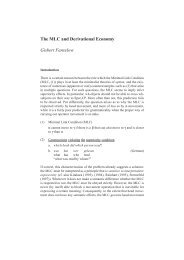Differential subject marking in Polish: The case of Genitive vs ...
Differential subject marking in Polish: The case of Genitive vs ...
Differential subject marking in Polish: The case of Genitive vs ...
Create successful ePaper yourself
Turn your PDF publications into a flip-book with our unique Google optimized e-Paper software.
‘I will not be at your concert.’<br />
b. (Ja) nie bede na twoim koncercie. (agentive)<br />
INOM NEG BE1.SG.FUT at your concert<br />
‘I will not be at your concert.’<br />
3.1.4 Further evidence for (non)agentivity<br />
<strong>The</strong> discussion <strong>in</strong> the previous sections has shown that while GEN “<strong>subject</strong>s” cannot be<br />
<strong>in</strong>terpreted as agents, NOM <strong>subject</strong> allows for such an <strong>in</strong>terpretation. This claim is additionally<br />
supported by two other tests, which are discussed below, namely (i) occurrence as imperatives<br />
and (ii) occurrence as ‘p<strong>of</strong>ectives’.<br />
<strong>The</strong> first test is illustrated <strong>in</strong> (35) below. 41 It shows that it is possible, though not very<br />
common, to use bywac and byc <strong>in</strong> imperative forms as long as the <strong>subject</strong> is understood as an<br />
agent, i.e., as someone who is able to perform what is required <strong>of</strong> him or her. Thus, for <strong>in</strong>stance,<br />
one cannot use a sentence like Badz na stole ‘Be on the table’, if the addressee <strong>of</strong> the imperative<br />
is an <strong>in</strong>animate object, e.g., a newspaper (unless, <strong>of</strong> course, the newspaper is<br />
anthropomorphized). Particularly <strong>in</strong>terest<strong>in</strong>g are the examples (35d) and (35e). <strong>The</strong> regular<br />
imperative form <strong>in</strong> (35d), <strong>in</strong> which the unexpressed <strong>subject</strong> would correspond to the NOM form<br />
(cf. TyNOM nie badz ‘lit.: You2.SG.NOM not be’ (‘Don’t be’)) has an agentive <strong>in</strong>terpretation: the<br />
addressee has control over his be<strong>in</strong>g or not be<strong>in</strong>g at home, or, to put it differently, he or she can<br />
volitionally cause the required state (<strong>of</strong> be<strong>in</strong>g or not be<strong>in</strong>g at home). In contrast, (35e), where the<br />
hortatory particle niech is used (cf. Swan 2002:242), cannot be understood agentively. Rather,<br />
(35e) is understood as a (somewhat funny) wish that it might so happen (‘let it be so’) that the<br />
addressee will not be at home. Notice that if the “addressee” is a third person, as <strong>in</strong> (35f), this is a<br />
perfectly licit sentence.<br />
(35) a. Bywaj czesciej u nas!<br />
BE2.SG.IMP.HABIT more <strong>of</strong>ten at us<br />
Lit.: ‘Be more <strong>of</strong>ten at our house!’ (≈ ‘Come to visit us more <strong>of</strong>ten!’)<br />
b. Nie bywaj tak czesto w nocnych lokalach!<br />
41 Actually, this test has been cited by Lak<strong>of</strong>f (1966) as one <strong>of</strong> the tests for isolat<strong>in</strong>g stative verbs. Lev<strong>in</strong> and<br />
Rappaport Hovav (1995:170f.) po<strong>in</strong>t out, however, that the tests cited by Lak<strong>of</strong>f, rather than isolat<strong>in</strong>g stative<br />
verbs, “turn out to isolate agentive from nonagentive verbs.”<br />
28

















